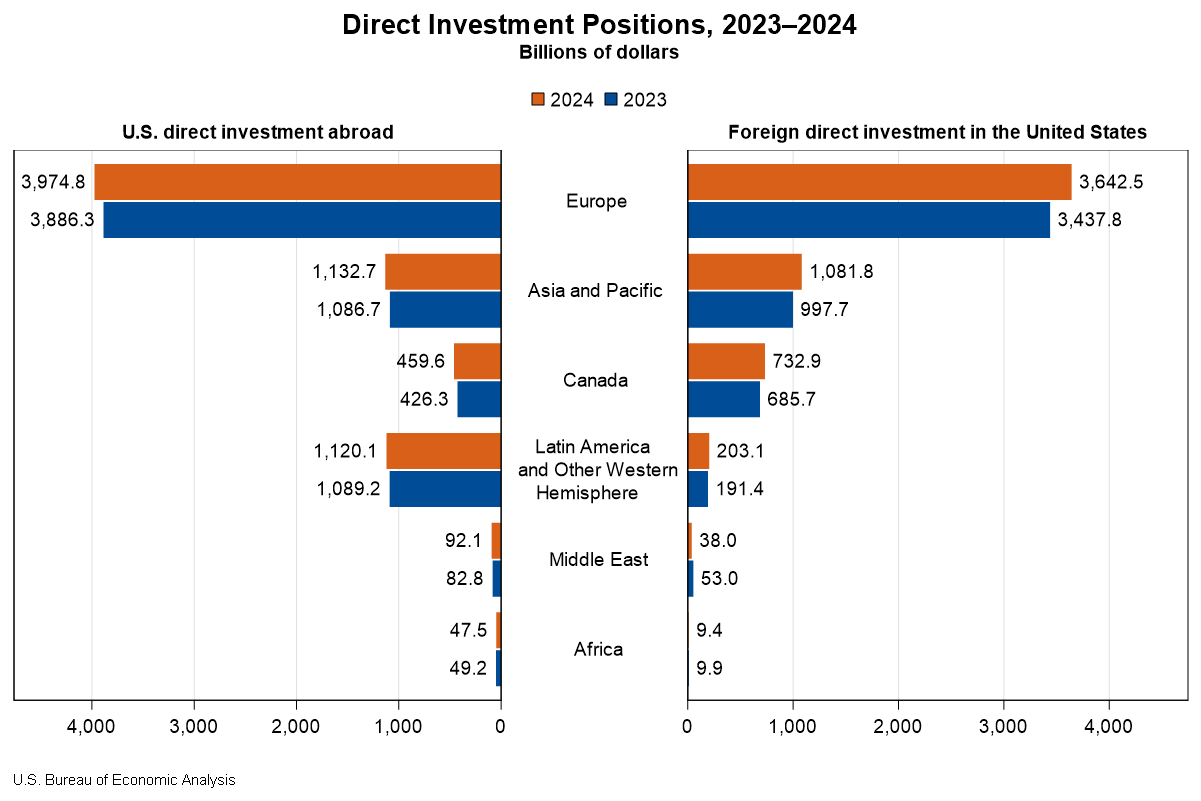Bureau of Economic Analysis
Direct Investment by Country and Industry, 2024
The U.S. direct investment abroad position, or cumulative level of investment, increased $206.3 billion to $6.83 trillion at the end of 2024, according to statistics released today by the U.S. Bureau of Economic Analysis. The increase was led by an $88.4 billion increase in the position in Europe, primarily in Luxembourg and Germany. By industry, manufacturing affiliates had the largest increase, led by manufacturing of computers and electronic products.
The foreign direct investment in the United States position increased $332.1 billion to $5.71 trillion at the end of 2024. The increase was led by a $204.7 billion increase in the position from Europe, which reflected a $52.9 billion increase from the United Kingdom and a $39.7 billion increase from Germany. By industry, affiliates in manufacturing increased the most.
Principal Federal Economic Indicators
Noteworthy
- 2025 News Release Schedule
- Innovation at BEA
- 2025 Annual Updates
- New! Services Trade Data for More Countries
- Data Tool: Trade in Value Added
- Distribution of State Personal Income
- Updated: RIMS II Regional Multipliers
- Arts and Culture
- Space Economy
- FDI Now in State BEARFACTS
- Quick Guide: Price Indexes
The Latest
July 2017 Trade Gap is $43.7 Billion
The U.S. monthly international trade deficit increased in July 2017 according to the U.S. Bureau of Economic Analysis and the U.S. Census Bureau. The deficit increased from $43.5 billion in June (revised) to $43.7 billion in July, as exports decreased more than imports. The previously published June deficit was $43.6 billion. The goods deficit decreased less than $0.1 billion in July to $65.3 billion. The services surplus decreased $0.2…
U.S. International Trade in Goods and Services, July 2017
Total July exports of $194.4 billion and imports of $238.1 billion resulted in a goods and services deficit of $43.7 billion.
Gross Domestic Product for Guam Increases in 2016
The Bureau of Economic Analysis released estimates of gross domestic product for Guam for 2016, in addition to estimates of GDP by industry and compensation by industry for 2015.
These estimates were developed under the Statistical Improvement Program funded by the Office of Insular Affairs of the U.S. Department of the Interior.
Revised estimates of GDP for 2013 to 2015, as well as revised estimates of GDP by industry and…
Personal Income Increases in July
Personal income increased 0.4% in July after showing no change in June. Wages and salaries, the largest component of personal income, increased 0.5 percent in July, the same increase as in June.
Personal Income and Outlays, July 2017
In July 2017, real disposable personal income increased 0.2 percent.
GDP Increases in Second Quarter
Real gross domestic product (GDP) increased 3.0 percent in the second quarter of 2017, according to the “second” estimate released by the Bureau of Economic Analysis. The growth rate was 0.4 percentage point more than the “advance” estimate released in July. In the first quarter, real GDP increased 1.2 percent.
Gross Domestic Product, 2nd quarter 2017 (second estimate); Corporate Profits, 2nd quarter 2017 (preliminary estimate)
Real gross domestic product (GDP) increased at an annual rate of 3.0 percent in the second quarter of 2017, according to the "second" estimate released by the Bureau of Economic Analysis. In the first quarter, real GDP increased 1.2 percent.
Measuring How Much People Save: An Inside Look at the Personal Saving Rate
The personal saving rate, technically described by BEA as “personal saving as a percentage of disposable personal income,” is the percentage households save of their after-tax income. For 2016, the rate was 4.9 percent. The saving rate is published monthly, quarterly, and annually with BEA’s Gross Domestic Product and Personal Income and Outlays statistics. Personal saving statistics are used by businesses, the White House and Congress, the…
BEA Releases New Health Care Statistics for 2014
The Bureau of Economic Analysis released a new set of statistics detailing how much the United States spends to treat different diseases and medical conditions.




